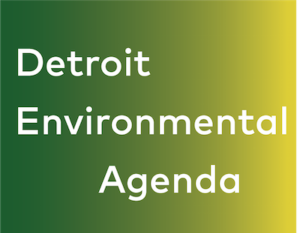Jasahn M. Larsosa
Candidate for Mayor

Q: Where can people go to learn more about your biography? If not readily available online, please describe in 150 words or less, your relevant experience, public offices held (if any), involvement in environmental causes, and membership in any environmental organizations. If you currently hold office, describe any votes or actions demonstrating concern for the environment.
A: https://focushope.edu/jasahn-larsosa/
I’m a community organizer, advocate, and nonprofit executive serving as Founding Director of Advocacy, Equity, & Community Empowerment at Focus: HOPE, a civil rights and human services organization founded in response to the racism leading to Detroit’s 1967 Rebellion. As an organizer, I’ve mentored dozens of activists and connected 100s of stakeholders to advance neighborhood agendas, including for increasing gardening, eco-friendliness, and outdoor activity. I was a key leader in establishing HOPE Village, a central Detroit neighborhood, as one of Detroit’ inaugural “eco districts”. As a nonprofit executive, I’ve attracted millions of dollars to serve seniors, engage youth, employ adults, and help families build wealth. As mayor, I will promote clean, safe, and prosperous neighborhoods and engage people normally put off from politics. By ensuring our lived experience is represented in power, I will lead Detroit’s growth and make us a national inspiration for equity and sustainability.
Community
Q: If elected, how will you work with Detroit residents to ensure that they benefit from and partake in the decision-making surrounding local development projects and that potential adverse impacts of those projects are identified, measured, monitored and mitigated? Moreover, how would you work to put more power into the hands of residents to maintain and revitalize their own communities and to access vacant land through the DLBA?
A: To ensure residents partake in the decision-making surrounding local development projects, I will employ my extensive network as one of Detroit’s demonstrated and trusted community organizers to prioritize the employment of social justice advocates and organizers in every corner of city hall. Through their expertise and partnership, I will oversee the institution of tested methods for engaging people around possibilities and ideas. I am also committed to thorough impact assessments which detail the opportunities and threats presented by new developments over the long term, and to the development of strategies and plans to optimize good outcomes and mitigate social and environmental risks. Residents will be supported in their participation in these assessments and for offering input into the way forward.
Finally, I am committed to the transfer of property and the building of wealth to people in the neighborhoods and will champion programs that not only offer land to residents, but also funding and other resources to assist in development.
Q: If elected, what budget appropriations would you propose to increase investment in needed social and environmental services to help improve the quality of life and health of Detroit residents?
A: My policy priority is to create economic opportunity for residents by making housing and home ownership affordable, and by creating locally owned businesses in the neighborhoods. This means introducing policy restricting tax captures for social and human services programs and championing a millage for creating permanent water and property tax affordability structures. It also means eliminating water shut-offs and tax foreclosures for residents. Additionally, I will champion a reparations fund to repair the harm done through red lining, emergency management, and mass incarceration. The fund will support housing programs and business development. I will also ensure that community block grants come to residents for home repair in the form of gifts and not loans.
Public Health
Q: What long term solutions do you see for addressing vehicle speeds and making our streets safer?
A: Not only dangerous driving, but also littering, and even shootings in the neighborhoods are as much propaganda as they are policy issues for me. As Mayor, I see part of my responsibility as serving as big brother and parental-figure-in-chief for youth and younger adults in the city. This means that I will be spending a good amount of time in the neighborhoods, among the residents, “holding court” in the streets, making myself accessible while also communicating clearly and consistently what I expect of the Detroit Family. It means that my administration will be highly visible, conducting their business not only from offices or from home, but also from accessible locations inside the city’s neighborhoods. Communities will feel loved by and connected to the Larsosa Administration and recognize its members as another great neighbor.
In this way, the institution of more speed bumps, of new driver and environmental enforcement practices, and new signage may be met with increased understanding rather than be seen as oppressive barriers put into place simply to restrict and control the people. Also, young adults need safe places to gather. When many of us were youth, we had places like Belle Isle, the 7 Mile Strip, and even the Sunday Races for coming together and blowing steam. Today, the commons have been stripped away. I plan to reclaim the commons for youth and adults so that we all have much-needed outlets for fun, socializing, and entertainment.
Q: How will you work to reduce the negative health impacts of air quality on the residents of Detroit?
A: We will set goals, undergo a strategic plan, and pass a budget for its implementation in order to significantly reduce carbon emissions in the city of Detroit by 2030. And frankly, we will learn as a city to say “no” to deals that are bad for our people.
Q: If elected, what actions will you take to work toward safer, healthier, and more affordable housing for all Detroiters?
A: My administration will champion a place-based (local) affordable housing guideline based on Detroit AMI and not that of surrounding cities. We will also increase the number of affordable units in the city. Thirdly, we will explore the local impact of rent controls while pursuing strategies to bring down the cost of home renovation through apprenticeship programs that allow non-credentialed skilled trade workers in the neighborhood to participate in neighborhood revitalization. Additionally on home renovation, we will facilitate bulk purchases of material so that home renovators can take advantage of reduced cost. We will ensure home owners have access to block grants for home repair and, finally, we will hold landlords accountable for keeping homes in compliance.
Energy
Q: What are your priorities to reduce emissions and lessen the impacts of climate change in Detroit during your term in office?
A: I was connected to a project introducing Detroit’s first LEED Platinum certified house. My administration will work with experts such as the leaders of this initiative to explore replication of this model while also scaling the number of homes that convert to solar energy, winterization, LED bulbs, efficient refrigerators and other tactics for reducing carbon emission. We will also explore credits for companies that convert to rooftop solar while also meeting other equity conditions for public subsidy.
Q: What are your plans for helping the city transition to renewable energy and how will you ensure that the cost benefits and increased resilience that come from the use of renewables is made accessible to low-income and vulnerable communities across Detroit?
A: Partner with cities across the country to buy in bulk and leverage the combined purchasing power.
Potentially work with DTE to purchase large-scale renewable energy.
Create a dedicated revenue stream to bring renewable energy to the community while ensuring a minimum percent goes to residents earning lower incomes.
Recycling
Q: How can the city increase recycling, composting, and the use of post-consumer recycled materials, while addressing the city’s litter and illegal dumping problem?
A: We could fund a collaborative of neighborhood groups and match them with a consistent stream of funding to develop and implement plans to put forward environmental solutions. The groups would have full support of the city for enforcement on dumping since violators are less likely to offend when local coordination is evident. Finally, robust messaging around recycling while continuing to ensure recycle bins are readily accessible will go a long way to reduce waste.
Jobs
Q: What steps would you take to prepare the local workforce to take advantage of and be part of the movement toward a green economy, through qualifying for good paying infrastructure and clean energy jobs, amongst others?
A: My administration will attract green companies and facilitate partnerships between them, the state, and workforce development nonprofits to ensure that our people are ready for the green jobs.
Water
Q: How will you ensure that clean water is accessible and affordable to all Detroiters?
A: I will introduce a permanent water affordability plan and end water shut offs for residents.
Q: How will you help municipal agencies and property owners integrate Green Stormwater Infrastructure (GSI) across the city to manage stormwater and reduce drainage charge fees for property owners?
A: We will partner with Green organizations to promote the importance and usefulness of GSI while providing support and resources to help businesses and residents transition.
Optional
Q: Please identify the top environmental concerns to you personally, identify the environmental issue in your community that is the most pressing, and what you would like to do as an elected official to address this most pressing concern.
A: The most pressing environmental concerns in the community from my perspective as a homeowner and resident raising three little girls here in Detroit are what my family calls the “three strays: Stray dogs, stray bullets, and stray cars jumping the curb”. My plan for these are to radically increase participatory governance while continuing as a lifelong resident, homeowner, and community organizer to be present and visible in the neighborhoods. As a father and life-long Detroiter, I understand that these issues are mental health and poverty issues. Young people need and deserve to be inspired, to be offered safe gathering spots, and to be afforded financial opportunities that increase their stake in the community while helping them contribute toward the generational wealth of their families. These are the priorities of my administration.

